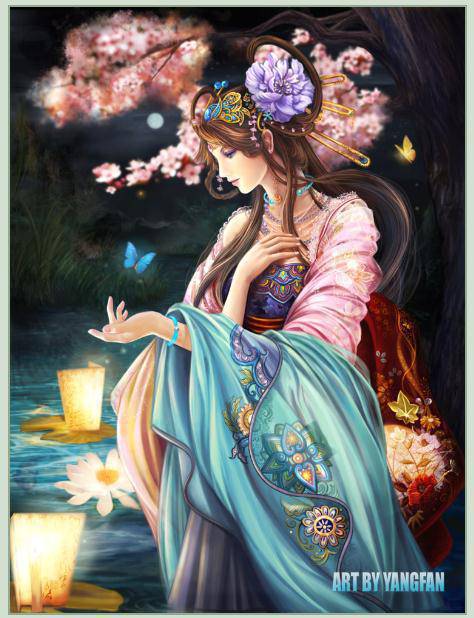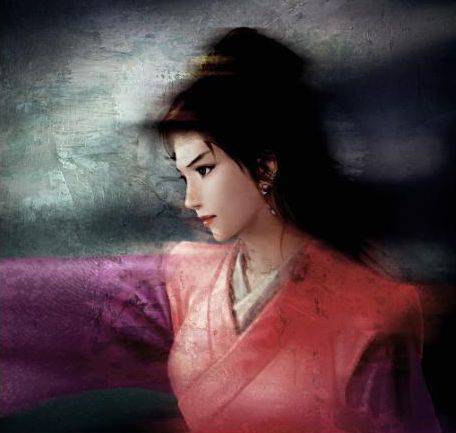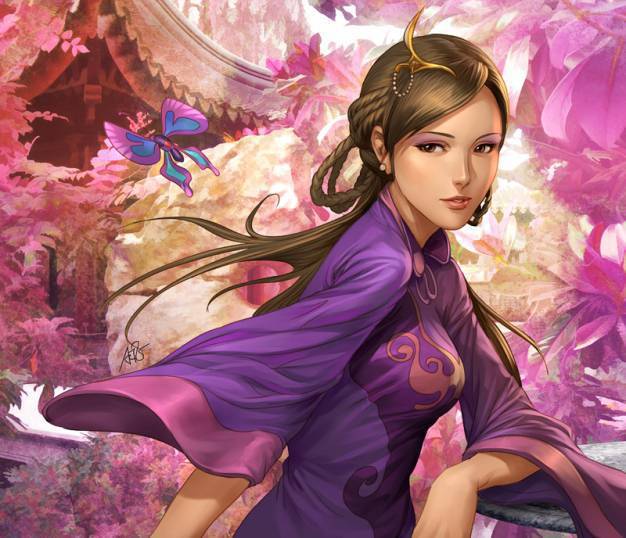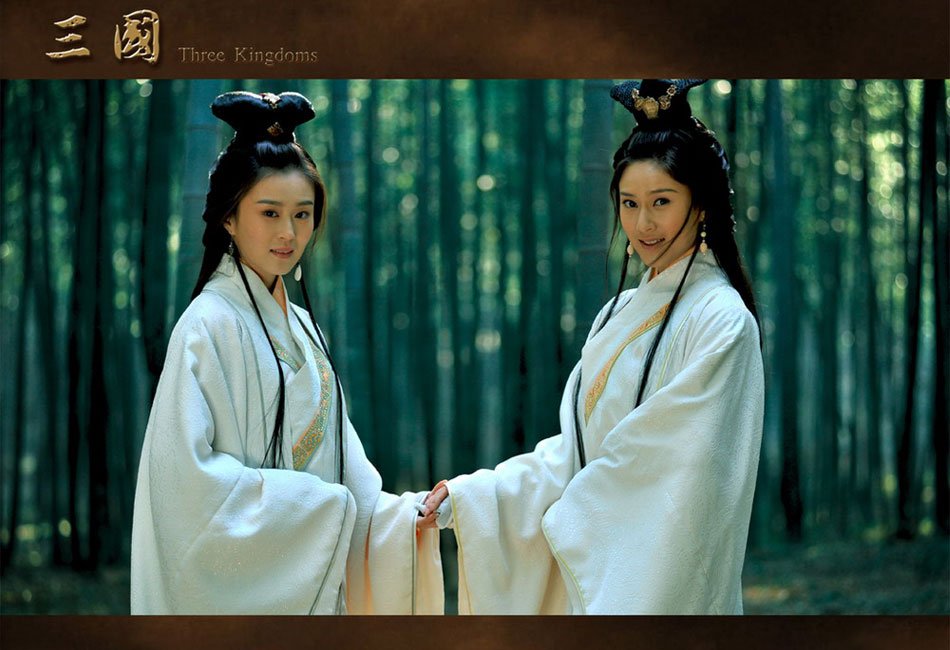Great Beauties of Qiao Sisters (Xiao Qiao and Da Qiao) 小喬 and 大喬
 •
by
•
by EternalLightStream

This time I will tell the
History :
Patriarch Duke Qiao of the southlands had two daughters, known as the Qiao sisters. The oldest, sometimes referred to as Da Qiao, was wed to Sun Ce, Sun Jian’s son and Sun Quan’s brother. The youngest, sometimes referred to as Xiao Qiao, was wed to Zhou Yu. There is no especial reference to either of them in actual history, and the exact details surrounding their appearance in Romance of the Three Kingdoms are largely fictional. Beyond the battle of Chibi there is no mention of what happened to either of them, though it is assumed they both remained in Wu.

In AD 201, mortally wounded, Sun Ce called for his wife, Lady Qiao (eldest of the two Qiao sisters) to share with her his final words. “Unhappily, we must part while I am still in the full vigor of life. Honor my mother with your filial love; and when you next see your sister, have her tell her husband to give Sun Quan her undying support, and not to stray from the path I have taught him to walk in life—for the sake of our friendship. After speaking, Sun Ce passed away peacefully at the age of twenty-six.

Da Qiao
Later, in AD 208, after Lady Cai proposed to Liu Zong—Liu Biao’s heir—to cede Jingzhou to Cao Cao, and the young lord agreed, Liu Bei was left with no choice but to flee Jingzhou toward the Riverlands. After some battle with Cao Cao he arrived at the Han River Ford, his only hope to resist Cao Cao’s forces and prevent the unification of China under his leadership being a mutual defense with Sun Quan, who had just come into power in the Riverlands.

Zhuge Liang departed from Liu Bei’s camp and traveled to meet Sun Quan, assuring Liu Bei that he would stir the young lord into action against Cao Cao. In the mean time, having heard of Liu Zong’s surrender, Lu Su, one of Sun Quan’s advisors, proposed winning Liu Bei’s trust as part of a measure to gain aid from him, and the remnants of Liu Biao’s forces under Liu Qi, to mutually defend against Cao Cao. The long-term objective being to transfer power into Sun Quan’s hands so he could better contend for the empire, and to secure authority in the upcoming battle.

Still in AD 208, Cao Cao, hoping to avoid any cooperation between the two of them, drafted a note urging Sun Quan to attend a hunting expedition to Jiangxia and, in the process of the expedition, remove Liu Bei from power. Sun Quan had not yet reached a decision. Zhang Zhao, an advisor under Sun Quan, urged his lord to dispatch Liu Bei and surrender to Cao Cao, believing resistance to be useless, and a faction formed supporting his views.
Lu Su, who was in attendance when Zhang Zhao addressed Sun Quan, did not agree and urged Sun Quan to resist Cao Cao’s forces. Seeing that Sun Quan was still unsure of what to do, Lu Su urged him to meet Zhuge Liang, who was presently inside the city. Sun Quan agreed. Also of the opinion that Cao Cao could be defeated, Zhuge Liang came before Sun Quan and his advisors and was forced to debate his view before them all, though nobody was able to refute his logic. Sun Quan, despite everything, was still unsure of what measures to take.
Seeing that Sun Quan was still unsure of what to do, Lady Wu reminded him of the advice Sun Ce had given on his deathbe
😛‘Consult Zhang Zhao on domestic difficulties, Zhou Yu on external ones,’ adding, “shouldn’t you now be consulting Zhou Yu?” Sun Quan, pleased to remember the advice, sent for Zhou Yu who was previously at the Poyang lakes directing naval training, though Zhou Yu had already come, hearing of the news. He did not immediately meet with Sun Quan.
Aware of Zhou Yu’s arrival, the various factions visited him to urge him into persuading Sun Quan of their own view, and he dismissed them all after hearing their sides, assuring each that they had his support. Later, Zhou Yu met with Zhuge Liang with Lu Su in attendance.
After formalities were exchanged, Lu Su questioned Zhou Yu, reviewing their position and asking for his view on the situation. Zhou Yu, however, explained, “Cao Cao acts in the name of the Son of Heaven, the Emperor, and cannot be defeated. He has grown so powerful that any hope of victory against him is little more than a foolish dream, without merit; fighting will bring us only certain defeat. If we surrender, we gain cheap security. Tomorrow I shall send an advocate representative to convey our intentions to Cao Cao.”
“But that is misguided!” refuted Lu Su, “our estate, founded by Sun Jian, now spans three generations. How can we abandon it to strangers with such a sudden decision? The last words of our Lord’s brother, Sun Ce, to our Lord Sun, urged him to entrust in you for advice in matters such as this, as if you were the great Mount Tai, to preserve the house of Sun. Surely you must not shy away from this trust?”
In appeal, Zhou Yu responded, “The souls living in the six districts of the Southlands are innumerable, and if we bring to them the disasters of war they will lay their grievances before us in turn. This is why I have decided on peace.”
“How wrong that would be!” cried Lu Su. “With a general of your talents the defensibility of our land is assured; Cao Cao is far from achieving his ambitions!” The two continued to debate, one refuting the views of the other in turn, though Zhuge Liang simply watched with an amused smile, well composed despite the situation.
“What makes you smile so disdainfully?” prompted Zhou Yu.
“Your antagonist, Lu Su, of course, who refuses to acknowledge the exigencies of the situation” responded Zhuge Liang.
“Now you’re mocking me for ignorance?” snapped Lu Su.
“Zhou Yu sues for submission, it seems perfectly reasonable?”
“Any scholar who recognizes realities—and Kongming is surely one—must be of the same mind,” interjected Zhou Yu.
“You too feel this way?” asked Lu Su of Zhuge Liang.
“Cao Cao is a master of warfare,” explained Zhuge Liang, “whom none under the Heavens dare to oppose. Those who have—Lü Bu, Yuan Shao, Yuan Shu, and Liu Biao—have all been destroyed. No such men remain in the empire, save Lord Liu, who has refuses to, ‘acknowledge the exigencies of the situation’, and continues to struggle with Cao Cao for mastery, however he now stands alone in Jiangxia with his very survival in question. The general’s plan to submit to Cao Cao guarantees the safety of his family in addition to protecting his status and wealth. What does it matter if the sacred throne of the Sun is transferred to another house? Why ascribe it to the Mandate of Heaven? There is no need for such things.”
Lu Su was moved to wrath. “So you would see my lord bend his knee and endure disgrace before a treasonous rogue?” he demanded .
Zhuge Liang, paying no heed to Lu Su, continued, “I have, however, considered one other possibility that should save us the ritual transfer of sheep and wine while we surrender our lands and offer up the seals of state. You would not even have to cross the river to meet with him, instead sending a single escort in the company of two people. Should Cao Cao come into possession of these two, his million-man army would toss aside their armor, take down their banners, and retire from the fields.”
“And who are they?” asked Zhou Yu.
“Parting with them,” responded Zhuge Liang, “to the Southlands could be likened to an oak shedding a leaf, or a granary diminished by a grain of millet. But should he get them, Cao Cao would depart from our lands content.”
“Who are these two people?” prompted Zhou Yu again.
“While in residence at Longzhong,” continued Zhuge Liang, “I heard that Cao Cao was preparing a new tower on the banks of the Zhang. It is called the Bronze Bird Pavilion, an absolutely magnificent and elegant creation. He has searched the lands far and wide for beautiful women to fill its chambers. Cao Cao, who by character is inclined to debauchery, has long known that the Southland patriarch Qiao had two daughters; women of such beauty their faces could make fish to forget how to swim, or birds forget how to fly; or humble the very blossoms and outshine the moon. He thus vowed, ‘First, I’ll sweep the realm of opposing forces and build my empire; next I’ll take into my possession the two Qiao sisters and install them into the Bronze Bird Pavilion so my later years might be filled with pleasure, giving me a chance to die without regret.’ Though it may seem Cao Cao has brought his million-man force to conquer the southlands, in reality he comes only for these two women. General, why not speak with the patriarch Qiao to procure the girls, then with a thousand pieces of gold in the company of a messenger, dispatch them into Cao Cao’s possession? With them, I assure you, he would leave most content. In times past Fan Li of Yue succeeded with a similar plan in presenting the beauty Xi Shi to the king of Wu. (4) You should surely act at once?”
“Can you verify Cao Cao’s desire of these two women?” asked Zhou Yu.
“He once commissioned his son, Zhi, a writer of great genius to compose a poem. The result is the ‘Bronze Bird Pavilion Rhapsody,’ (5) its theme only allowing allusions to the fitness of his house for the throne, and his vow to wed the daughters Qiao. Should you wish to hear it, I think I could recall it. I admire it greatly.”
“Try,” was the response, to which Zhuge Liang recited the poem .

A pleasant promenade beside His Majesty:
They mount the tiered tower, delight their spirits,
And view the teeming richness of the realm,
The sphere his sagely virtue rules.
These gates he built pierce the mid-sky;
The double pylons float to the crystalline.
Splendid viewing rooms sit suspended there,
Linked chambers seem to hang above the western wall.
They peer down on the ever-flowing Zhang,
Whose gardens give promise of teeming glory.
Aloft on either side, twin towers—
Left, Jade Dragon; right, Golden Phoenix—
To hold his brides, the Southland daughters Qiao,
With whom he will take his pleasure, morning, evening,
Look down on the royal city’s spacious elegance;
Behold the shimmering tints of distant clouds.
Rejoice in the confluence of many talents;
Auspicious dreams of aid will be fulfilled.
Look up! The gentle solemnity of spring;
And hear! The lovelorn cries of every bird.
May those proud towers stand till Heaven’s end.
Our house has gained a twin fulfillment.
Our benevolent influence spreads across the realm,
Winning universal homage for our capital.
Even the splendor of Huan and Wu, ancient hegemons,
Pales beside his sagely grace and wisdom.
Most blessed! Most marvelous!
His generous favor, extending far and wide.
Lend the sovereign house your aid.
That unto the four corners peace may reign.
Our king is on a scale with Heaven and earth,
Radiant as the light of sun or moon,
Ever honored as the ultimate principle,
Immortal as the sky’s sovereign star.
Driving the dragon banners round the royal circuit.
Guiding the phoenix chariot round the realm:
His clement influence bathes the kingdom’s corners;
Prize offerings to him heap high—the people prosper.
May these towers stand firm for all time.
For pleasure never failing and without end.
After Zhuge Liang had finished reciting the poem, Zhou Yu stood violently from his seat, pointing north. “You old rebel! Rogue! This insult is too deep!”
Zhuge Liang also rose from his seat, quickly checking him. “But remember then khan of the Xiongnu, when he encroached on our borders? The Emperor of Han granted him a princess to promote amnesty through kinship? How can we begrudge him two female commoners?”
“There is something you do not know,” explained Zhou Yu. “Of the two daughters of patriarch Qiao, the elder is the widow of Sun Ce, our late ruler, the younger Qiao is my own wife!”
Feigning great astonishment, Zhuge Liang showed his remorse. “No indeed! I did not know. I blurted the suggestion—a deadly fault—a deadly fault! I have said something and offended you most gravely, a thousand pardons!”
“Cao Cao, you old traitor!” cried Zhou Yu, his anger unabated. “The two of us shall not share footing on this earth! I swear it!”
“The situation must be considered carefully,” cautioned Zhuge Liang.
“I hold the sacred trust of the late Lord, Sun Ce,” explained Zhou Yu. “How could I bow a knee to one such as Cao Cao? What I said just now was simply to see where you stood. I left Poyang Lake with the intention of attacking the northlands, and nothing will change my heart on this matter. Not even a sword at my breast or an ax at my neck. I trust you will lend an arm, so that we might destroy Cao Cao together?”
“Should I not be rejected, I would gladly render such humble services as I could. Perhaps presently I might be able to offer a plan to oppose him?”
“I am going to see my lord tomorrow, we will discuss the matter then,” was Zhou Yu’s response. Zhuge Liang and Lu Su then departed. The next day Zhou Yu went before Sun Quan and questioned Zhang Zhao as to his decision, dismissing it as the opinion of an ill-advised student, then proposing to Sun Quan that they stand together to drive away Cao Cao’s forces. These events, among others, led up to Cao Cao’s famous defeat at Chibi.
Later, on December 10, AD 208, before meeting facing the allied southern forces on Chibi, Cao Cao held a party for his officers. Wine was passed around, and as the hours passed he became quite intoxicated. At one point he pointed to the south to Xiakou , and shouted, “You do not amount to much, with your puny force, Liu Bei and Zhuge Liang! How foolish it is of you to attempt to shake the Taishan Mountains! What folly!”
Then, turning to his officers, he continued, “I am now fifty-four years of age. If I can obtain the Southlands I shall have my humble wish. In days long past, the Patriarch Duke Qiao in the south and I were great friends, and we came to an agreement on certain matters, for I know his two daughters, the Qiao Sisters, were of beauty beyond compare. To think that Sun Ce and Zhou Yu would take them as their wives before me!

Recently, I constructed the Bronze Bird Pavilion on the River Zhang. If I win the Southland I shall wed these two women and install them in the Tower, and they will rejoice my declining years. My desires will then be completely fulfilled!” He smiled in anticipation, then broke into laughter.
Du Mu, a famous poet of the Tang Dynasty, wrote :
Half-rusted, broken in the sand, this halberd,
Scraped and cleaned, calls up an era past.
Had that east wind not done Zhou Yu a turn.
Two Qiaos in spring would have gone to the tower.
Cao Cao then fought the forces of Zhou Yu and Liu Bei at Chibi and faced a crushing defeat, thanks to several plots formed by Zhuge Liang, Zhou Yu, and Pang Tong, and vital assistance from Xu Shu, who saw through Pang Tong’s plot to chain their ships together, and chose not to advise Cao Cao. The Qiao sisters were never taken from Wu.


Comments
QiaoMaXXX
Wow : )
Thank u bro so much, am sure Emily will like it too.
TC and be better asap ; )
@}-}---
這世界乍看之下有點灰 The world seems a little grey
你微笑的臉有些疲憊 Your smiling face seems a little tired
抬起頭天空就要亮起來 Look up, the sky is shining
不要放棄你的希望和期待 Don't give up your hope
沙漠中的一滴淚 A drop of tear in the desert
化成綠洲的湖水 can turn into the lake in the oasis 😉
_/\_
Never give up!
o7
Thank you so much my dear brother, this is wonderful... 😘
take care please, and return to us healthy again... :hug: